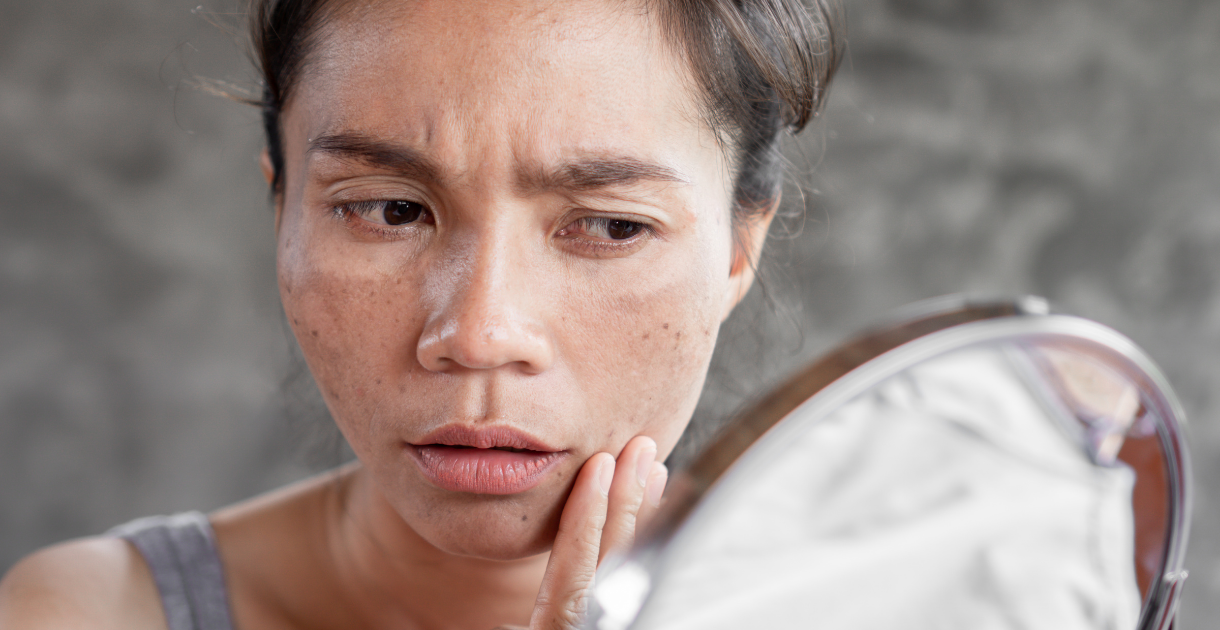When Skin and Mood Tell the Same Story
If you’ve ever battled breakouts and mood swings at the same time, it’s not a coincidence. Your hormones play a powerful role in both your skin and your emotional well-being. When they’re out of balance, the effects show up on your face — and in your mind. At Klinik Q, we help patients uncover how these systems connect, so they can finally heal from the inside out instead of chasing temporary fixes.
How Hormones Affect Both Skin and Mood
1. Estrogen and Progesterone: The Balance Keepers
These two hormones work in harmony to regulate your menstrual cycle, mood, and even how your skin behaves. When estrogen dips or progesterone spikes, your oil glands become more active, leading to clogged pores and breakouts. At the same time, hormonal fluctuations can trigger mood instability or anxiety.
2. Androgens: The Acne Culprit
Androgens like testosterone stimulate sebaceous (oil) glands. When they rise — whether due to PCOS, stress, or diet — you may notice cystic acne around the jawline, chin, or back.
3. Cortisol: The Stress Hormone
High cortisol not only worsens anxiety but also increases inflammation, which aggravates skin conditions like acne, eczema, and psoriasis. It’s a vicious cycle — stress causes breakouts, which cause more stress.
4. Thyroid Hormones: The Metabolism Regulators
An underactive thyroid (hypothyroidism) can lead to dry, dull skin and low mood, while an overactive thyroid may cause oily skin, irritability, or restlessness.
Your hormones, skin, and mood are interconnected through the gut-brain-skin axis — meaning your digestive health, stress levels, and hormonal balance all influence one another. For example:
- Gut inflammation can increase cortisol and worsen acne
- High stress lowers progesterone, leading to mood swings
- Hormonal imbalance triggers both sebum production and emotional sensitivity
When one part of this system is out of sync, the others follow.
When to Suspect a Hormonal Cause
It’s time to check your hormones if you notice:
- Acne that worsens around your menstrual cycle
- Sudden mood swings, irritability, or anxiety
- Adult-onset acne (starting in your 20s, 30s, or later)
- Oily skin paired with fatigue or irregular periods
- Persistent breakouts despite good skincare and diet
How Klinik Q Helps You Heal Inside and Out
At Klinik Q, we look beyond surface-level symptoms. Our holistic, root-cause approach includes:
- Comprehensive hormone testing – to evaluate estrogen, progesterone, testosterone, thyroid, and cortisol levels
- Personalized treatment plans – addressing both internal hormone balance and external skin care needs
- Nutrition and lifestyle guidance – optimizing gut health, stress management, and sleep
- Long-term monitoring – ensuring sustainable results and hormonal stability
Lifestyle Tips for Hormonal Balance & Clear Skin
- Eat smart: Choose foods rich in zinc, omega-3s, and antioxidants
- Manage stress: Try meditation, journaling, or breathing exercises
- Sleep well: 7–9 hours allows hormones to regulate naturally
- Avoid sugar spikes: Refined carbs worsen insulin and androgen levels
- Support your gut: Include probiotic foods like yogurt or kimchi
If you’re dealing with both acne and anxiety, your body isn’t broken — it’s communicating. Hormones are deeply intertwined with how you feel and how your skin looks. At Klinik Q, we help patients restore that balance from within, so your mind feels calm and your skin glows naturally.



